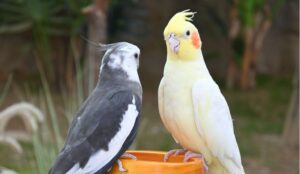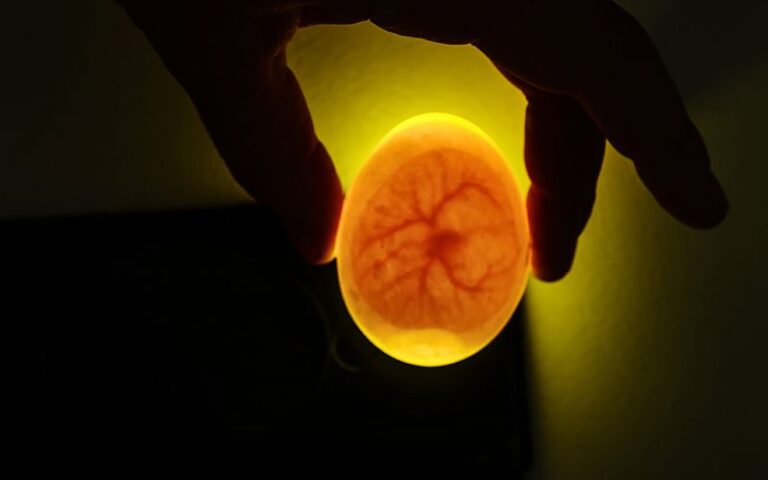To tell if a cockatiel egg is fertile, hold it to a bright light source and look for veins or a dark shadow inside the egg. The presence of these indicates that the egg is fertile and developing.
However, determining the fertility of a cockatiel egg is not always easy, and it can be helpful to consult a veterinarian or an experienced breeder for further guidance. By closely observing the appearance of the egg and seeking expert advice, you can better understand its fertility status.
Understanding The Process Of Cockatiel Egg Fertilization
During the cockatiel breeding process, it is essential to understand how egg fertilization occurs. Cockatiels, like other birds, reproduce through sexual reproduction. The male cockatiel will mate with the female, and the eggs will be laid after a successful breeding session.
A quick overview of the process involves the male mounting the female and transferring sperm into the female’s oviduct. In the oviduct, the eggs are fertilized as they pass through. After fertilization, the eggs will develop and eventually hatch into baby cockatiels.
One of the key factors that influence egg fertilization is the presence of a fertile male. A male cockatiel must be sexually mature and capable of producing viable sperm. Additionally, the female’s reproductive health is vital in successful egg fertilization.
Distinguishing between fertile and infertile cockatiel eggs can be challenging, especially to the untrained eye. However, some key differences can help determine the status of an egg.
| Characteristics | Fertile Egg | Infertile Egg |
|---|---|---|
| Appearance | The fertile egg will have a clear embryo visible inside. | The infertile egg will be clear or opaque with no visible embryo. |
| Smell | Fertile eggs may have a slight, distinct odor due to embryonic development. | Infertile eggs generally do not have any odor. |
| Weight | Fertile eggs tend to be slightly heavier due to the growing embryo. | Infertile eggs tend to be lighter as they lack a developing embryo. |
By closely examining these characteristics, cockatiel owners can determine if an egg is fertile or infertile, helping them manage their breeding programs and expectations.
Understanding the process of cockatiel egg fertilization and the differences between fertile and infertile eggs is crucial for cockatiel breeders. By paying attention to these factors, breeders can increase their success rate and ensure the health and well-being of their cockatiel chicks.
Visual Indicators Of Fertility

Examining the appearance and color of the eggshell:
- Eggshell Appearance: A fertile cockatiel egg typically has a smooth surface with a consistent color. It should not have any cracks or dents.
- Eggshell Color: Fertile cockatiel eggs generally have a white or off-white color. Any discoloration or unusual pigmentation could indicate infertility.
Using a candling technique to observe the developing embryo:
- Candling: Hold a bright light source, such as a flashlight, near the egg in a dark room. Look for the presence of shadow or movement within the egg, which suggests active embryo development.
Recognizing blood vessels and movement inside the egg:
- Blood Vessels: Fertile eggs will showcase a network of small, delicate blood vessels when candled. These vessels deliver vital nutrients to the growing embryo.
- Movement: As the embryo develops, you may also notice slight movement when candling the egg. The visible motion indicates a fertilized egg.
Behavioral And Incubation Clues
Analyzing the incubation behavior of the cockatiel parents is crucial in determining the fertility of their eggs. Monitoring the duration and consistency of nest incubation is one way to assess the progress of the eggs. Both parents’ consistent and prolonged presence in the nest is a positive sign. Regularly observing the parents exchanging nest duties also indicates their dedication to incubation. Another clue lies in identifying signs of successful hatching attempts. Look for subtle changes in the eggs’ appearance, such as a slight increase in clarity or the presence of hairline cracks. However, be cautious not to handle the eggs excessively as it can disturb the embryos. Remember that only a qualified avian veterinarian or an experienced breeder can give a definitive answer regarding the fertility of cockatiel eggs. They may employ additional techniques like candling to shed light on the matter. Understanding the behavioral and incubation clues can provide valuable insights into whether a cockatiel egg is fertile.
External Assistance In Determining Fertility
When determining if a cockatiel egg is fertile, seeking guidance from a professional avian veterinarian is a great way to ensure accurate results. These experts have the knowledge and experience to assess the eggs and provide valuable insights. Additionally, utilizing specialized tools for egg inspection can offer a closer examination of the egg’s viability. These tools help to identify vital signs like embryo development and blood vessel formation. Another helpful resource is consultation with experienced breeders or cockatiel enthusiasts. They have firsthand experience with breeding and can provide tips and advice on determining fertility. Overall, combining professional guidance, specialized tools, and insights from experienced individuals can help you determine whether a cockatiel egg is fertile.
Common Challenges And Limitations In Assessing Fertility
Assessing the fertility of cockatiel eggs can be tricky, as there are several common challenges and limitations to consider. Dealing with uncertainty and variations in visual indicators adds to the complexity of the process. While some eggs may appear fertile, they may ultimately fail to develop. This can be disheartening for bird owners and breeders, who rely on accurate assessments to plan for successful hatching. Additionally, identifying early signs of fertility can pose difficulties, requiring careful observation and knowledge of the specific breed’s characteristics. Overcoming these challenges may involve seeking guidance from experienced aviculturists or consulting reliable resources to enhance understanding. By acquiring the necessary skills and knowledge, bird enthusiasts can improve their ability to determine the fertility of cockatiel eggs with greater accuracy and precision.
Essential Steps To Confirm Fertility
Assessing the fertility of a cockatiel egg requires a systematic approach to ensure accurate results. Proper handling of the eggs is crucial during the assessment process. It is essential to handle the eggs delicately to avoid any damage that might affect the evaluation. Maintaining optimal conditions is also important for conducting accurate assessments. Eggs should be kept in a stable temperature and humidity environment to promote healthy development. Furthermore, carrying out consecutive assessments can provide a higher level of certainty in determining fertility. By assessing the eggs at different stages of incubation, you can gather more information and increase the accuracy of the evaluation. Remember to document your findings and consult with experienced breeders or avian specialists for additional guidance. By following these essential steps, you can confidently determine whether a cockatiel egg is fertile.
Safely Discarding Or Incubating Infertile Eggs
Understanding the importance of removing infertile eggs: It is crucial to be able to identify whether a cockatiel egg is fertile or not. This helps in effectively managing the breeding process.
Proper disposal methods to prevent potential health risks: If you determine that an egg is infertile, it is important to dispose of it properly. This helps avoid potential health risks to the bird and its environment. A safe disposal method is to crush the egg and dispose of it in a sealed bag to prevent contamination.
Alternative options for incubating infertile eggs: In certain situations, you may opt to incubate infertile eggs despite their lack of viability. This can be done for various reasons, such as offering a more natural environment, providing companionship for a nesting female, or simply for educational purposes. However, it is important to note that the success rate of incubating infertile eggs is low.
Frequently Asked Questions On How To Tell If A Cockatiel Egg Is Fertile
How Do You Check An Egg For Fertility?
To check an egg for fertility, hold it up to a light source and look for a dark shadow or a ring within the egg. If you see these signs, the egg is likely fertile.
Do Cockatiels Lay Infertile Eggs?
Yes, cockatiels can lay infertile eggs. Cockatiels, like many other birds, can lay eggs even without mating with a male partner. However, these eggs will not develop into chicks as they are not fertilized.
How Do You Tell If An Egg Is Fertilized Without Cracking It?
To determine if an egg is fertilized without cracking, you can handle it. Hold a light source against the egg and observe the contents. A fertilized egg will show veins or a developing embryo, while an unfertilized egg will appear clear or slightly opaque.
How Can You Tell If A Cockatiel Egg Is Fertile?
To determine if a cockatiel egg is fertile, look for a small, round, red spot on the surface. This is the embryo. If the egg is fertile, it will gradually form a network of veins. You can also candle the egg, which involves shining a light through it to see if movement or development is inside.
Conclusion
To determine if a cockatiel egg is fertile, there are some key signs to look out for. By observing the incubation process, examining the appearance of the egg, and paying attention to the parents’ behavior, you can gain insight into its fertility.
Remember to handle the eggs carefully and seek expert advice if needed. Ensuring the well-being of your cockatiel eggs is essential for a successful breeding experience.

Hi, I’m Regina Rios. Just another bird lover who loves to share knowledge from personal experience. I’ve grown up with pet birds since childhood as my mommy also loves birds. As I can’t pet many birds in open air in my house as my mom does; I created my first bird cage on my rooftop using wood, copper wire, and a metal shed in 2018 and start collecting pet birds. Now, I have so many pet birds such as Macaws, Parrot, Cockatiel, Parakeet, and others. Not only that, if I see natural birds are injured I keep them in my house until they get well. Now, my hobby becomes my income source as my home birds have babies and I sell them to birds lover like mine. I’ve created this blog to inspire others bird owners by sharing my personal knowledge. Good Luck!


